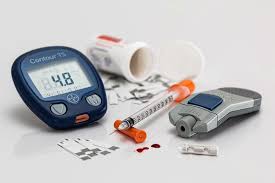
Have you ever had to go to hospital and were made to feel like animated meat? Graphic yes, but that is how I felt when I had the [dis]pleasure of being ‘doctored’ by some lady doctor some time ago.
I suffer from allergies and they can flare up anytime and manifest in various ways. This particular instance, no one is sure that triggered the allergies but one morning I woke up itching like it was some alien on Independence Day; then before you can say Will Smith, my skin morphed into elephant skin…literally. And when I say ‘my skin’ I mean every single inch of my body – from my eyelids to between my toes. And boy did it itch! It was obvious within hours that no home remedy would solve this problem so off to the hospital I went…itching all the way.
To say my experience was horrid would be an understatement. I left the doctor stripped of my dignity, confused about the severity of my ailment (the doctor had this disgusted look on her face, and wouldn’t even touch me even while wearing gloves. She used her pen to move my limbs to get a better look at the ravages of the allergic reaction).
 Now this was years ago, fast-forward four years and my dad is in the same hospital and boy did they tick me off.
Now this was years ago, fast-forward four years and my dad is in the same hospital and boy did they tick me off.
Where is it written that medical practitioners should not be customer service practitioners? Where is it written that doctors, nurses, laboratory assistants do not need to learn to respect and make their patients feel valued? What kind of humanity cannot offer even the simplest dignity to another human at their most vulnerable?
It is in response to these (and other) horrid experiences at hospitals that I have put together this ‘brief’ list (I have much more to say on this topic to this audience) that I hope hospital administrators will read and use as a springboard for bringing customer service skills to our hospitals; that they will really begin to respond to what customers [patients] want.
Start seeing patients as customers.Taking care of patients is what healthcare is all about. It may be hard for some people to think of patients as customers, but they definitely are. Their choices bring thousands and even millions into a hospital’s coffers. Their patronage pays salaries and ensures the hospital can afford the equipment it needs to stay in business. In most cases, patients/customers don’t necessarily need to use your hospital, even though you have the country’s top gynecologist, cardiologist, surgeon etc. on staff. Patients/Customers have a choice and they may end up at the institution down the street that treats them with dignity (not like animated meat).
 Be courteous and respectful. Always, always, make sure patients are treated with courtesy and respect – at every point. Would you lift someone’s shirt/blouse without permission and start to press and prod at their abdomen? Then why do it to your patient? Would you go poke someone with a nail/needle? Then why almost attack me with your needle in the guise of collecting a sample. You don’t even ask me if I am comfortable or apprehensive about the process! Your patient knows she is overweight; why (dear Nurse) would you look down your nose at her and tell her that the reason she is suffering from heartburn is because she is overweight (this really happened to a friend of mine) – without running any tests!? You aren’t even the doctor, and no one knows why you are offering your diagnosis. It is so sad that treating patients has become simply a job for many healthcare professionals. They manifest boredom with their jobs by treating patients indifferently (like the nurse who had her eye on the TV while checking my pulse). That’s not professional and it’s bad business! Continue and soon you will be out of a job – and not because you were fired, but because your hospital went out of business because of the likes of you.
Be courteous and respectful. Always, always, make sure patients are treated with courtesy and respect – at every point. Would you lift someone’s shirt/blouse without permission and start to press and prod at their abdomen? Then why do it to your patient? Would you go poke someone with a nail/needle? Then why almost attack me with your needle in the guise of collecting a sample. You don’t even ask me if I am comfortable or apprehensive about the process! Your patient knows she is overweight; why (dear Nurse) would you look down your nose at her and tell her that the reason she is suffering from heartburn is because she is overweight (this really happened to a friend of mine) – without running any tests!? You aren’t even the doctor, and no one knows why you are offering your diagnosis. It is so sad that treating patients has become simply a job for many healthcare professionals. They manifest boredom with their jobs by treating patients indifferently (like the nurse who had her eye on the TV while checking my pulse). That’s not professional and it’s bad business! Continue and soon you will be out of a job – and not because you were fired, but because your hospital went out of business because of the likes of you.
Never show indifference to patients. Watch the way patients are treated when entering the hospital reception! Some people would even roll their eyes when a patient approaches? Worse even, I have been made to feel like I was there to waste your time when I asked to see my doctor. Your patient is not a nasty side effect of your business, your patient is the sole object of your business existence. The patients need to feel this esteem at every point.
 If the illness is not life-threatening, patients are virtually given a number and told to sit down and wait; I have had to wait at A&E (at Aberdeen Royal Infirmary) for over two hours before (another story for another day) Many otherwise competent and even brilliant healthcare professionals give patients the feeling they are an inconvenience and a bother. Patients should not be made to feel inferior and misinformed.
If the illness is not life-threatening, patients are virtually given a number and told to sit down and wait; I have had to wait at A&E (at Aberdeen Royal Infirmary) for over two hours before (another story for another day) Many otherwise competent and even brilliant healthcare professionals give patients the feeling they are an inconvenience and a bother. Patients should not be made to feel inferior and misinformed.
Don’t contradict, argue or match wits with your patients please. Telling patients they are wrong about anything is just plain rude. Even when they have incorrect information, they still should be accorded respect. If you disagree with them, politely explain why their point of view isn’t necessarily correct. Your goal should be to explain and communicate, and then to continue to explain and communicate. Help patients understand what is going on as treatment is being given. Patients should feel they are just important, in the scheme of things, as you are.
Your patients are not the unfeeling, mute cadavers you are so used to; they have opinions, feelings, fears and concerns. Please medical practitioners take that into consideration.
 Tell patients you appreciate their business. These days whenever I go to the hospital, I feel like I have become a part on an assembly line in a factory. You don’t look up when I walk in; you don’t smile, shake my hand or see me to the door when the consultation is done. Instead, I feel hurried, and leave with a strong suspicion that you just want to get to the next part on the assembly line.
Tell patients you appreciate their business. These days whenever I go to the hospital, I feel like I have become a part on an assembly line in a factory. You don’t look up when I walk in; you don’t smile, shake my hand or see me to the door when the consultation is done. Instead, I feel hurried, and leave with a strong suspicion that you just want to get to the next part on the assembly line.
Everybody likes to be thanked when purchasing an item in a retail store, but in all too many healthcare venues, saying “thank you” is seen as inappropriate. Why? Did we exchange our humanity and curtesy for the Hippocratic Oath?
While we are on the topic of service as a strategy for healthcare practitioners, I’d like to recommend this stunning little ebook “Spark of Service” it succinctly captures TEN actionable strategies both service organisations and practitioners can execute with minimum fuss, to keep customers coming back and giving raving reviews. Grab your copy and get the spark!





